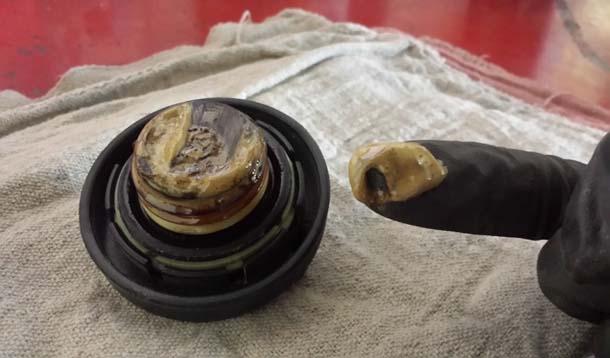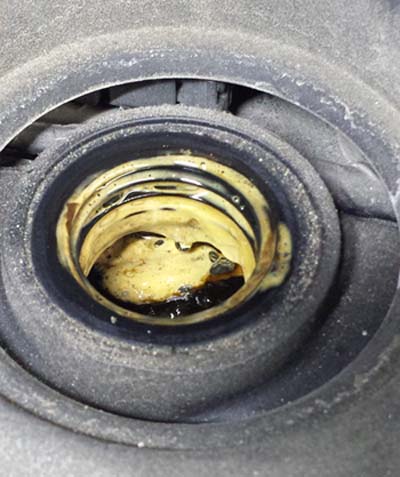

Look under your engine oil cap and you may see a milky, frothy residue. There are a couple of reasons for this — one being more serious than the other. In either case, it's not ideal for your engine.
At our auto repair shop, we typically see this due to condensation in the engine. This happens more often during weather changes and we also see it in cars where clients don't drive it a lot. Driving short trips doesn't allow the engine enough time to burn off the water vapours. Over time, this milky sludge builds up and accumulates. Your technician may suggest running a chemical through the engine to clean out this sludge, and you can help by driving the car for a longer duration.
For our clients who primarily drive short trips, we recommend taking the car out for a good drive where the engine can reach operating temperature and maintain that long enough to burn off the water vapours. Luckily for us in Markham (Ontario) there's a few good shopping malls within 30 minutes of highway driving so that gives us someplace to go! If your spouse has a longer commute, give him or her the car once every week or two so that they can take the car to work. Remember that the worst thing for a car is to have it sit for long periods, drive it periodically or use it for frequent short trips. Your car is designed to work and be driven!

Another (and more concerning) reason for the milky residue is because coolant has mixed in with the engine oil. This is a serious concern that could indicate a head gasket leak or engine damage. When engine oil is contaminated, this significantly reduces its ability to provide lubrication and may quickly lead to engine failure.
If you notice water droplets on the oil cap in addition to the milky residue, then most likely it's just condensation. If you have other symptoms including the need to top up coolant frequently, brownish colouring in the coolant reservoir, or white smoke coming out of the exhaust, then coolant may be mixing with the engine oil. You will definitely need to bring your car in for service before the problem gets worse!
Need help describing your car's noises? Check out “Does Your Car's Noise Sound Like A Raging River?” Want to know what helps your technician when you drop off your car? Here are “Some Essentials To Help Your Auto Technician.”

The image you see above is from a 2013 Honda Accord. This car came to our shop recently, and for any of you that drive a Honda or Acura product, you’ll know that the maintenance reminder starts to count down in percentage how much "oil life" your car has. Ever wonder what happens below 5%? It starts counting negatively in mileage! The cluster above is showing that the client was 3,574kms OVERDUE on the oil change.
Do you want to know the single best thing you can do to maintain your car? Be on time with maintenance! I pull from personal experience—my husband’s 2004 Toyota Corolla has over 400,000kms on it and I don’t do anything special to the car. I put regular oil in (not synthetic) and we do maintenance items on time (things like filters, spark plugs, and fluid changes). Our clients who maintain their cars regularly have less major repairs and love their cars! It’s interesting to me that more often than not, clients who don’t maintain their cars regularly also lament that their cars are always breaking down. Well, it’s no wonder!
Every now and again, we get asked which car is a good one to buy. I honestly advise purchasing a car that has a maintenance schedule they can maintain. Trust me, a reliable car has a lot to do with the driver. Give me a luxury, well-built car, and if I don’t do the maintenance on time, guaranteed it won’t be worth much in a few years. On the other hand, a run-of-the-mill car can be reliable if I maintain it properly.
Let’s say you are on time, all the time. Except this one time, you’re slightly overdue on maintenance. Generally speaking, that would be fine. It’s a one-off thing. But for the majority of clients who are late on their maintenance, they’ve been consistently late. It’s a driver habit, and it doesn’t change when they get another (newer) car. The effects of being late will show up as long-term damage to the car.
Think of it this way—the general mantra is that we should drink 8 glasses of water a day. Let’s say I always drink that much, but one day I only drank 5 glasses of water. I probably won’t feel any significant effect, especially if the next day I’m back on my routine. Contrast that with me consistently drinking only 5 glasses of water each day. The long-term effect on my body will include dehydration and internal organ damage. And by the time it gets diagnosed, there’s no amount of water I could drink to make up for my neglect.
The fact that so many of us rely on our cars begs the question: can you afford (both time and money) to be without your car because you didn’t properly maintain it?
Want to include auto repairs in your spending plan? Read "Budgeting for Auto Repairs." Heads up: read this about a "Common Scam: Cheap Oil Changes."